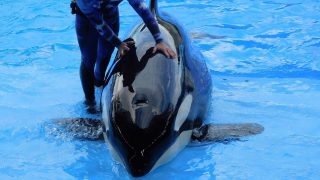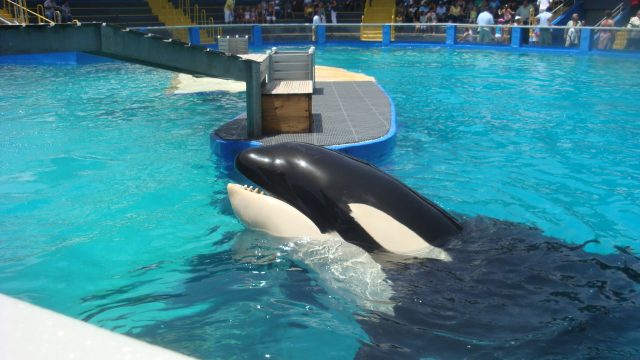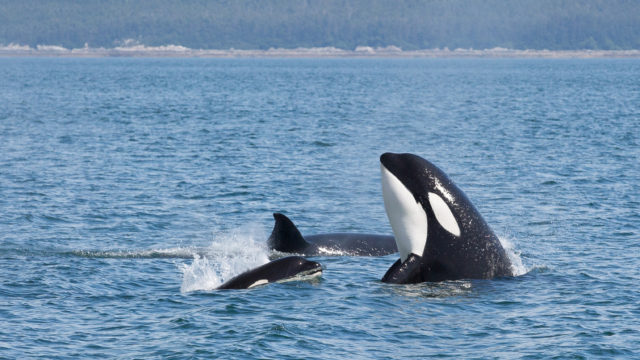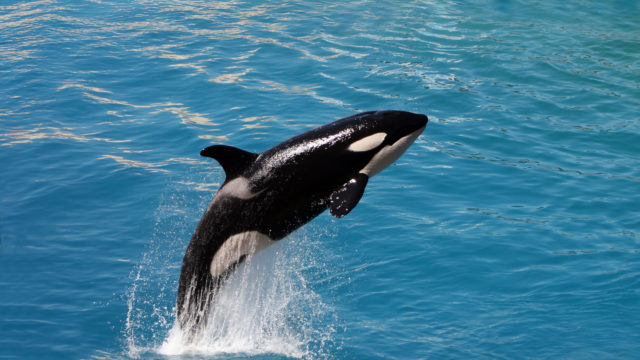
Animal Legal Defense Fund Responds to Death of Kasatka the Orca
Contact: media@aldf.org
The Animal Legal Defense Fund is saddened to learn that Kasatka, yet another orca who has been suffering for years in captivity at SeaWorld has died. Kasatka was almost 42 years old and her decline in health has long been a concern for those closely monitoring the situation at SeaWorld.
John Hargrove, a former orca trainer who swam with Kasatka, had urged media outlets to press SeaWorld further on Kasatka’s struggle with chronic infection, which had been apparent to experts for years, but was well-hidden by SeaWorld, which was desperate to avoid critical press coverage. Less than a month ago, SeaWorld announced the death of a three-month-old orca calf, Kyara.
SeaWorld has released a memorial video for Kasatka, calling her “the matriarch,” a sad reminder of the life Kasatka should have had. Had Kasatka not been taken from her ocean home in 1978, she would have enjoyed life as a true matriarch, living with her calves in a tight knit family.
Instead, SeaWorld’s definition of “matriarch” means Kasatka was bred multiple times, her first born was sent to another facility after only a few years together, and her physically and emotionally stressful life in captivity damaged her so severely she was consistently observed unable to care for her most recent calf. Calling Kasatka a “matriarch” is simply another example of SeaWorld’s blatant disregard for orcas’ natural lives and their suffering in captivity.
“As we mourn Kasatka’s chronic illness and eventual death, we deepen our resolve to put an end to stories like hers, and pass the Florida Orca Protection Act,” says Animal Legal Defense Fund Executive Director Stephen Wells. “The bill would turn SeaWorld’s corporate commitments into law, making it illegal to hold any new orcas in captivity, or to breed captive orcas.”
The Florida Orca Protection Act, modeled after a similar bill passed in California, is the next step to granting orcas the protections they deserve. The bill has not yet been formally introduced, after the representative who agree to sponsor it made a sudden about-face, inspiring speculation that SeaWorld and its lobbyists had launched a counter campaign to fight the bill.
While SeaWorld’s commitment to end its captive breeding program met with applause from a public more savvy than ever about the exploitation of animals for entertainment, company promises have historically been far from a guarantee. In honor of Kasatka and the many other orcas who have suffered, we need laws, not just SeaWorld’s word, to end orca exploitation.
John Hargrove, former SeaWorld training turned animal advocate, stated:
“After years of illness and suffering, Kasatka has finally died prematurely from disease. This makes the third captive orca death at SeaWorld since January and fourth in the last 20 months. I worked and swam with with her for many years but now I am sickened that I ever was a participant in what captivity is and more importantly what is does to these orcas. Even after being chronically ill and on massive amounts of drugs, SeaWorld forcibly impregnated her in August 2011 with the semen from a solitary captive orca in Argentina, creating a cross-bred calf.
They intentionally forced the nearly 18 month gestation and nearly two years of nursing knowing Kasatka was chronically ill. Even today, after I urged the media to get answers, SeaWorld has never explained what appears to be massive fungal and bacterial lesions that covered her face and body. For these reasons and many more, I am deeply committed to giving my full support for the introduction of the ‘The Florida Orca Protection Act’ which will be the same framework of the bill which has already been signed in to law in the state of California. This cruelty must end not just on a state level but on a federal one–which other countries have already successfully accomplished.”
Related
-
Lolita the Orca Dies at the Miami Seaquarium
Captured from her wild family as a juvenile, Lolita endured decades of inhumane conditions, spurring protests and numerous legal actions to help her.August 22, 2023 News -
Statement on Lolita
Response to Announcement to Return Lolita to Puget SoundMarch 30, 2023 Press Release -
2019 Florida Legislative Session Kicks into Gear
This year’s Florida legislative session promises to be one of the busiest yet for animals. The Animal Legal Defense Fund is in the halls of the legislature every day – advocating for animals who would otherwise not have a voice.March 18, 2019 News



